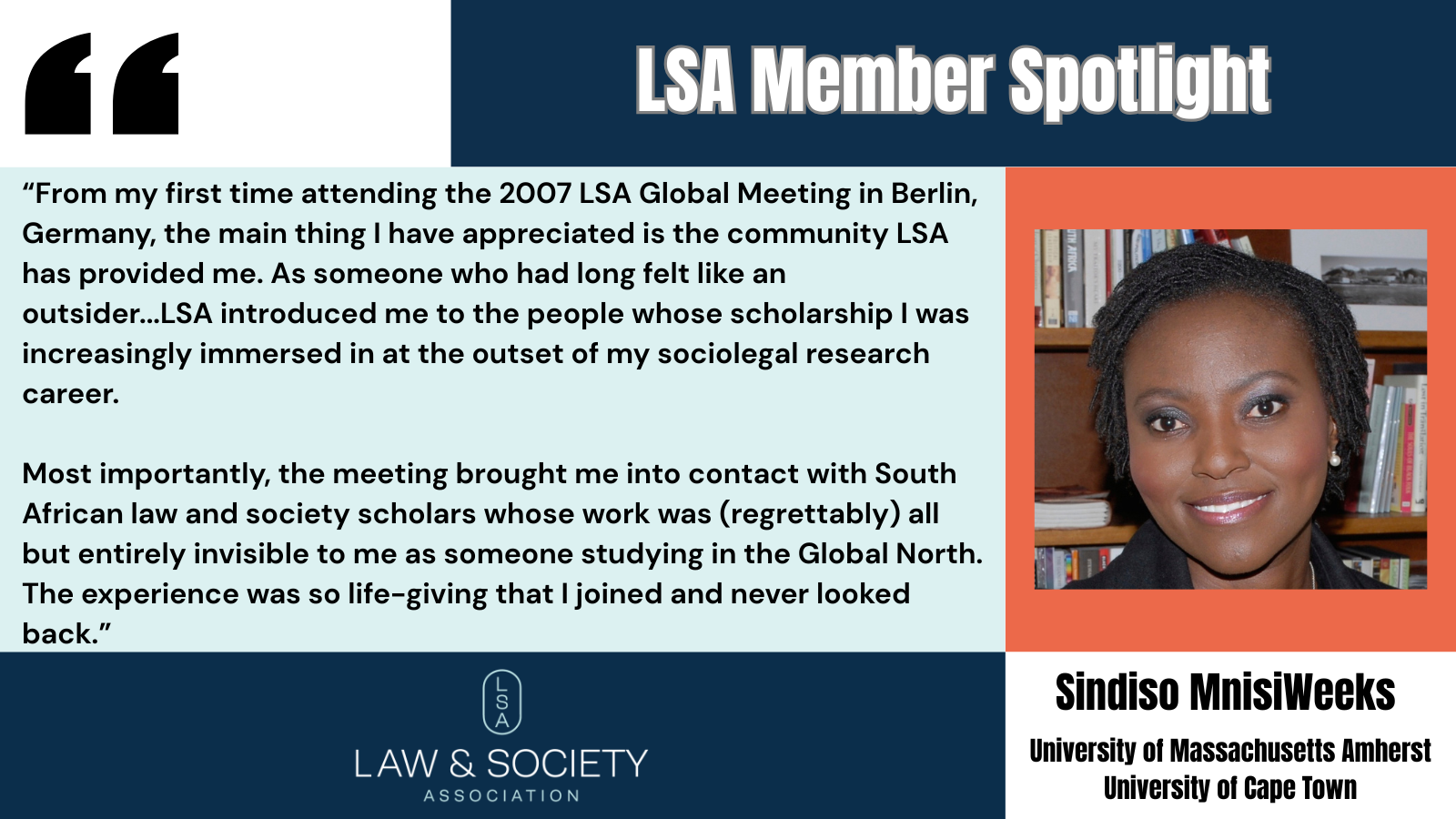Get to know Sindiso MnisiWeeks!

Institution:
University of Massachusetts Amherst
University of Cape Town
Number of years as LSA member:
18
Number of LSA Meetings Attended:
11
LSA Governance Position(s) and Committees:
Representative, Class of 2026 Board of Trustees | 2024-2026
Member, Executive Committee | 2024–2026
Organizer, CRN 13: African Law and Society | 2022–present
Member, Program Committee | 2013–2014, 2021–2022
Member, Graduate Student and Early Career Workshop Committee | 2019–2020 and 2020–21
Other Association Affiliations:
American Anthropological Association
African Studies Association
Areas of Research:
Indigenous Law
Constitutionalism
Colonialism, Postcolonialism, and Decolonialization
Legal Pluralism
Women’s Rights
Economic and Social Rights
Access to Justice
Legal Ethnography
Favorite Topics to Teach or Research:
Decolonizing Law
Human Rights-Based Approaches to Social Justice
Owning Property: Inequality in Law (aka Property and Social Justice)
Law, Societies and Global Justice
Constitutional Ethnography
Historical Linguistics as Sociolegal Archive (the alternative intellectual roots of the Ntu)
Unique Skill or Fact:
I descend from the former Swati royal line in precolonial Eswatini, so I like to say I’m kind of a princess. But, more seriously, I was so passionate about drama in high school that I auditioned for, and subsequently appeared in, a television show. (To my chagrin, I periodically hear about reruns many years after it was filmed).
I very nearly went to film school but, at the last minute, decided to go to law school after all. Since I’d been announcing my intention to be a lawyer from about eight years old, I feared I’d probably regret it if I didn’t, at the very least, give that path a good faith effort.
Additional Hobbies:
Music (singing, guitar)
Practicing languages
Traveling
Trying new cuisines
Studying pop psychology
Playing soccer with my kids
Notable Awards:
University of Massachusetts Amherst Chancellor’s Leadership Fellowship | 2023-2024
Carnegie African Diaspora Fellowship | 2015, 2017
National Research Foundation of South Africa, Y1 Rating | 2014-2019
South African Department of Science and Technology Women in Science Award – Emerging Researcher | 2012
Social Sciences Research Council – Mellon Mays Graduate Studies Enhancement Grant | 2008
Rhodes Scholarship, South Africa-at-Large and New College | 2005
Top Three Books and/or Publications:
Alter-Native Constitutionalism: Decolonising ‘Common’ Law to Transform South Africa (Cambridge University Press, forthcoming 2023)
“South African Legal Culture and Its Dis/Empowerment Paradox,” Oxford Handbook of Law & Anthropology (Oxford University Press, 2021)
Access to Justice and Human Security: Cultural Contradictions in Rural South Africa (Routledge, 2018)
Education:
DPhil, University of Oxford | Law and Socio-Legal Studies
MSt, University of Oxford | Legal Research
LLB, University of Cape Town (cum laude)
BA, University of Cape Town | Law, Philosophy and Language (with distinction)
Major Appearances:
“Sindiso MnisiWeeks and the Case for an Alter-Native Constitutionalism in South Africa,” The PALcast, June 10, 2024
“NH’s ‘Divisive Concepts’ Bill,” The Exchange, (New Hampshire Public Radio), May 5, 2021
“What Concerns Remain with the Traditional Courts Bill?” Eusebius McKaiser Show, (Talk Radio 702/Cape Talk), May 10, 2018
“Traditional Courts Bill,” Public Radio International (National Public Radio), June 21, 2012
“Judge for Yourself with Judge Dennis Davis,” ETV, May 2012
What do you find the most beneficial about being an LSA member?
From my first time attending the 2007 LSA Global Meeting in Berlin, Germany, the main thing I have appreciated is the community LSA has provided me. As someone who had long felt like an outsider, barely at the margins of my scholarly fields of law (my primary discipline at the time) and anthropology (the secondary discipline in which I was training), LSA introduced me to the people whose scholarship I was increasingly immersed in at the outset of my sociolegal research career.
Most importantly, the meeting brought me into contact with South African law and society scholars whose work was (regrettably) all but entirely invisible to me as someone studying in the Global North. The experience was so life-giving that I joined and never looked back (only the childbearing years have been enough to keep me from attending the LSA annual meeting; all my babies were well-timed for the academic calendar, but that meant they clashed with LSA).
Since then, I have received invaluable mentorship through the Graduate Student and Early Career Workshop, as well as the Collaborative Research Networks I engaged with, especially CRN 13: African Law and Society. I have also valued the many opportunities to turn around and give back through service in those same spaces.
Rather than having a disciplinary identity, I think of myself as a law and society/sociolegal scholar first. I consider the LSA my primary academic home.
Why should professionals or students join LSA?
Part of what makes LSA so great is its “big tent” nature, which makes it easy for people to find their sub-communities within it. This is especially true for scholars whose interests straddle numerous intersections. LSA has also created spaces, such as the Graduate Student and Early Career Workshop(s), that can serve as on-ramps for finding and plugging into networks. I continue to cross paths with some of the folx I met at the GSW (2008) and ECW (2013) in and through project collaborations and committees many years later. Indeed, many exciting projects in which I am involved came together via an LSA connection.
I have also found the people within LSA to be very generous with their mentorship. Whenever I have needed career advice or reference letters, there has always been a group of LSA mentors for me to reach out to. These people have been faithful supporters of my career and personal well-being as I navigate academia transnationally.
LSA’s investment in expanding access and amplifying the voices of scholars located in under-resourced parts of the Global South is really important because it simultaneously redistributes resources and helps create more equitable epistemic relationships. Its dedication to periodic global meetings and support of the International Research Collaborations has contributed to meaningful international conversations, exchanges, and partnerships that are enriching the broadening the body of knowledge that we think of as the sociolegal studies canon.
Submitting papers for the LSA Annual Meeting is also much less intimidating that it can be for other associations. LSA takes a deliberately generous and inclusive posture toward proposers; the recent move toward multilingualism by permitting paper panels in Portuguese at the meeting in Lisbon is an example of the association’s commitment to expanding access and inclusivity.
In that vein, one of the more recent LSA changes that I have greatly appreciated (even though I have not accessed it myself) is the fact that childcare grants are now made available for people to apply if they need them, which increases the ability of junior scholars, especially, to participate in meetings.
There are many reasons for professionals and students to join LSA; these are merely a sampling.
Learn more about Sindiso MnisiWeeks, her many publications, media appearances, awards, and involvement with academic organizations by viewing her website here.


